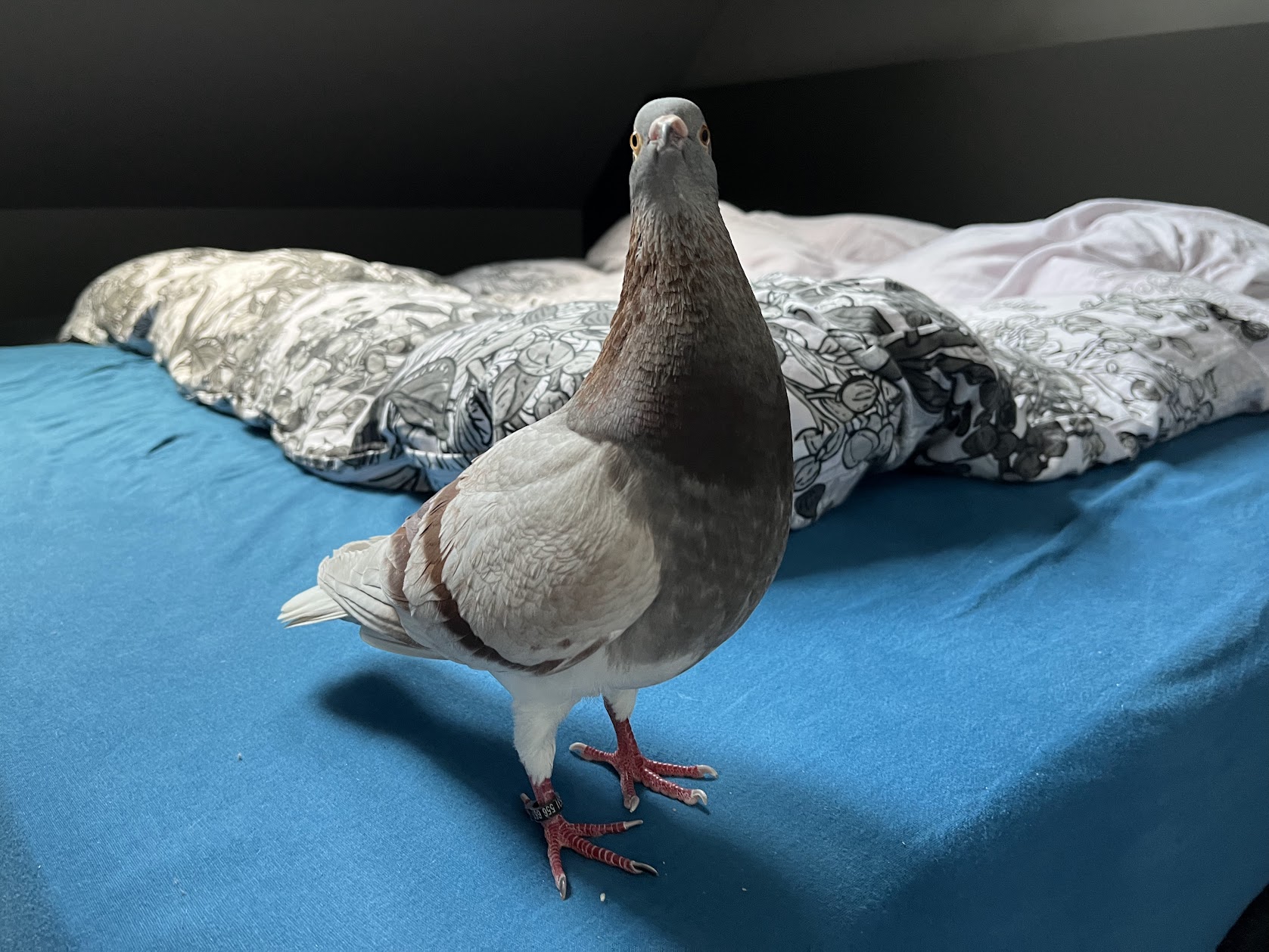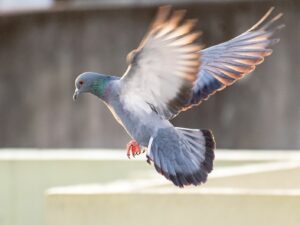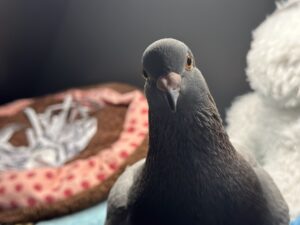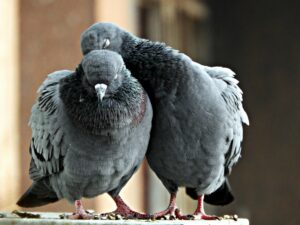Ever wonder what the world looks like through a pigeon’s eyes? As a pigeon owner, I’ve often found myself pondering this question.
One particular aspect that interests me is their ability to see at night. Do pigeons have night vision, similar to some other animals?
Can they find their way around when the sun goes down?
Let’s dive into the subject and find out more about pigeon vision, especially their capability to see in the dark.
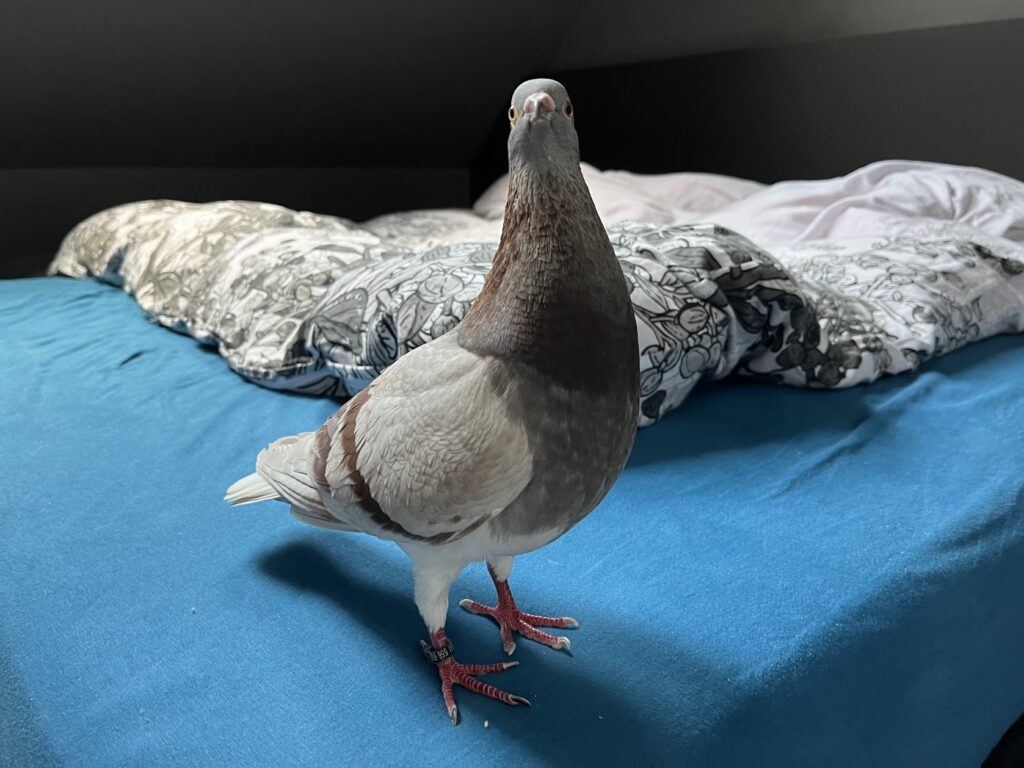
Can pigeons see in the dark? Table of contents
Can pigeons see in the dark? TL;DR
Pigeons, like many birds, have a vision adapted primarily for daylight hours. While they don’t have night vision akin to nocturnal animals, they do have some ability to see in low light conditions due to their larger eyes and the presence of more rod cells. However, their activity levels drop significantly at night, indicating they prefer to rest and are not adapted to night-time activities.
Basic Overview of Pigeon Vision
Understanding pigeon vision requires a deeper look at the physiological components and processes that constitute their unique way of seeing the world.
Anatomy of a Pigeon’s Eye
The structure of a pigeon’s eye has some unique characteristics that make these birds fascinating subjects for study. Unlike human eyes, which are located at the front of the head, pigeon eyes are positioned on the sides. This arrangement provides a wide field of vision, spanning up to 340 degrees, without needing to move their heads. This ability is particularly useful for spotting predators and food sources from various angles.
The pigeon’s eye has a higher concentration of rod cells compared to humans. These cells, responsible for detecting light and dark changes, shapes, and movement, help pigeons adapt to different light conditions. They also have cone cells, but these are mainly used for daylight vision and color perception, an area where pigeons excel by seeing a wider spectrum of colors than humans.
Check similar articles:
- Why Do Pigeons Bob Their Head?
- Why Do Pigeons Stand On One Leg?
- Pigeons As Pets – Everything Abut Pet Pigeon Keeping
- Can Pigeon Poop Kill You?
How Pigeons See: Vision Capabilities
Now that we understand the anatomy of a pigeon’s eye, we can delve into the capabilities these physical characteristics provide.
Pigeons have monocular vision, meaning they use each eye independently, providing them a panoramic view of their surroundings. This vision style contrasts with human binocular vision, where both eyes are used together to focus on a single point.
In terms of color perception, pigeons outshine humans. They not only see the same color spectrum that humans do, but they can also see ultraviolet light, a color outside of our visual capabilities. This additional color range can help pigeons navigate and find food.
While pigeons are primarily daytime birds, their higher concentration of rod cells gives them a certain level of vision in lower light conditions. However, they do not have the advanced night vision seen in some nocturnal animals. At dusk, pigeons typically settle into their nests or roosting spots for the night.
Pigeons and Daylight Vision
Daytime activities dominate the life of a pigeon. Let’s understand why good daylight vision is paramount for these creatures.
Pigeons’ Vision During the Day
Pigeons thrive during daylight hours, and their vision plays a crucial role in their day-to-day activities. Some specific aspects of pigeon daylight vision include:
- Color Perception: Pigeons can see a broad spectrum of colors, even beyond what humans can perceive. They can detect ultraviolet light, a capability that aids in food detection and navigation.
- Detail Recognition: Pigeons have a keen eye for detail, especially for small, moving objects. This ability helps them spot food sources and predators from afar.
- Depth Perception: Although pigeons have monocular vision, they can judge distances and depth well enough to navigate through their environment and to fly at high speeds.
Importance of Good Daylight Vision for Pigeons
Daylight vision is crucial for pigeons, impacting their survival and quality of life:
- Finding Food: Good vision helps pigeons locate and identify food sources, including spotting food crumbs in urban environments or grains in the countryside.
- Avoiding Predators: Keen sight during daylight helps pigeons detect the approach of predators, giving them enough time to escape.
- Social Interaction: Pigeons use visual cues for social interaction. Recognizing fellow pigeons and reading their body language is essential for their communal life.
- Navigation: Pigeons are famous for their homing abilities, and vision plays a significant role in this. They use visual landmarks to guide their way home, even over long distances.
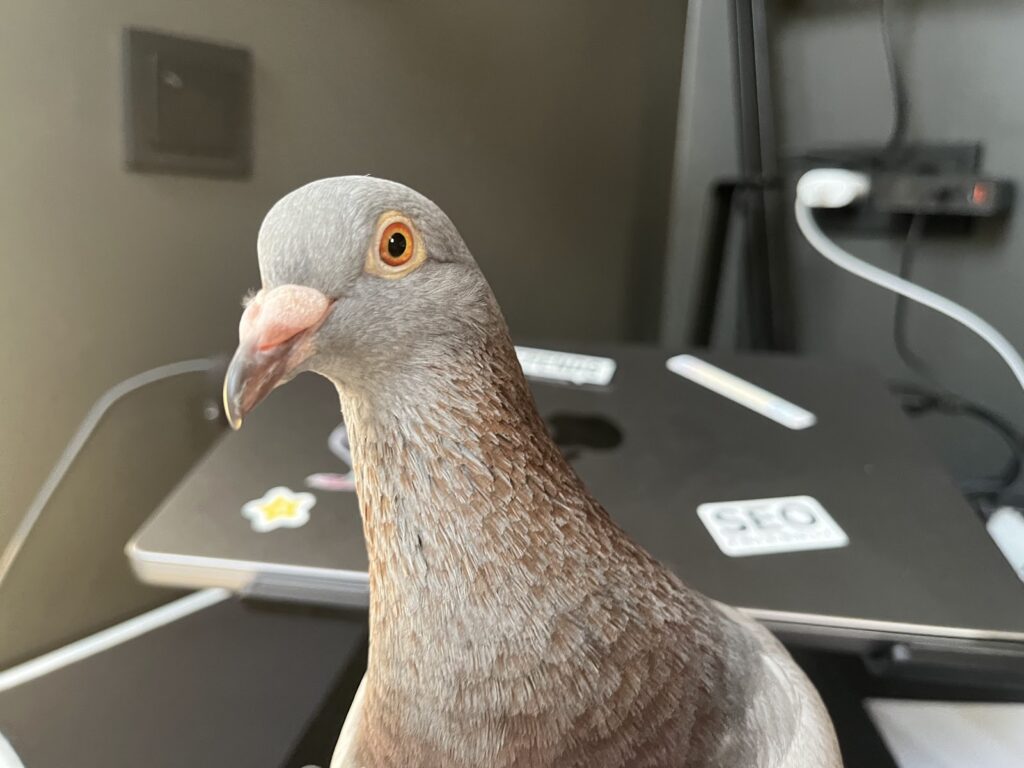
Can pigeons see in the dark? Pigeons and night vision
Night vision, or the lack thereof, also has a significant impact on pigeon behavior and lifestyle.
Can Pigeons See in the Dark?
While pigeons are not blind in the dark, their vision is not optimized for low-light conditions. They lack the specialized structures that nocturnal animals have for improved night vision, such as the tapetum lucidum – a layer of tissue in the eye that reflects visible light back through the retina, increasing the light available to the photoreceptors.
Pigeons do have a high number of rod cells in their eyes, which are more sensitive to light and movement than cone cells. This implies they have some ability to navigate in dim light. However, their overall activity during the night is significantly reduced, suggesting their visual acuity in the dark is limited.
Role of Night Vision in Pigeons’ Lives
The limited night vision capabilities of pigeons have shaped their behavior and lifestyle:
- Roosting at Dusk: As light levels drop, pigeons typically seek out their nests or a safe spot to roost. Their reduced vision in low light conditions makes nighttime activities, particularly flying, riskier due to potential collisions and predator attacks.
- Predator Evasion: The pigeon’s natural predators, such as owls and hawks, often have superior night vision. Pigeons, with their limited night vision, are at a disadvantage after dusk, which may explain why they typically retire to a safe spot when it gets dark.
- Activity Cycle: Pigeons are diurnal animals, meaning they are active during the day and rest at night. This aligns with their vision capabilities, which are optimized for daylight hours.
In summary, while pigeons do have some night vision capabilities, they are not true nocturnal animals. Their behavior, activities, and safety measures are largely based on their daylight vision abilities.
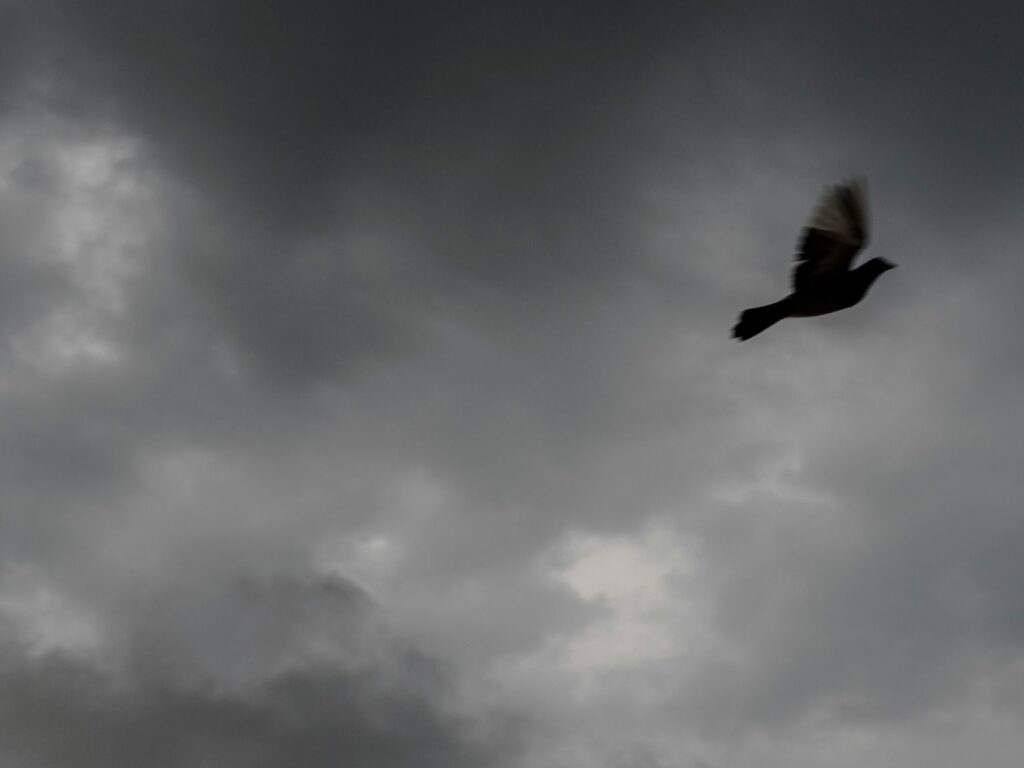
Comparing Pigeon Vision to Other Birds
Pigeon vision differs from many other bird species, each adapted for their unique lifestyle and environment.
Comparison of Pigeon Night Vision to Nocturnal Birds
Compared to nocturnal birds like owls and nightjars, pigeons have far inferior night vision. Nocturnal birds have larger eyes relative to their body size, more rod cells in their retina, and adaptations like the tapetum lucidum, which significantly enhances their ability to see in low light.
Comparison of Pigeon Vision to Other Diurnal Birds
Even among diurnal birds, pigeon vision has distinct characteristics. For example, falcons, known for their exceptional eyesight, have a higher concentration of cone cells in their retinas, giving them superior detail resolution at great distances. Pigeons, while having good detail recognition, might not match the visual acuity of falcons.
However, pigeons outperform many diurnal birds in their ultraviolet (UV) vision capabilities. The ability to see UV light aids in their navigation, food detection, and mate selection, a feature not as prominent in many other bird species.
How Pigeon Vision Affects Their Behavior
A pigeon’s vision significantly influences its daily activities and interactions.
Influence of Vision on Pigeon Feeding and Flying Habits
Pigeons rely heavily on their visual acuity for feeding. They locate food using their color perception and detail recognition. The ability to see UV light also plays a role, as some food sources might reflect UV light, making them easier to spot.
Vision is also vital for their flying and navigation abilities. Their depth perception, combined with the ability to use visual landmarks, enables them to safely fly and navigate their surroundings, even over long distances.
Impact of Vision on Pigeon Social Behavior
Social interactions among pigeons are also influenced by their vision. Pigeons recognize each other based on visual cues and use these cues during courtship displays and territorial disputes. The UV light reflection from their feathers can signal health and fitness to potential mates, impacting their mating success.
In essence, a pigeon’s vision plays a critical role not only in its survival but also in its social interactions and successful reproduction.
Can pigeons see in the dark? FAQs
Here are the most often-asked questions about pigeon vision in the dark.
Can pigeons see in the dark?
While pigeons can navigate in dim light due to the rod cells in their eyes, their vision is not optimized for darkness like that of nocturnal animals.
How well do pigeons see at night?
Pigeons have some night vision capabilities, but their activity levels reduce significantly in the dark, indicating their visual acuity is limited in low-light conditions.
Do pigeons have better night vision than humans?
Both pigeons and humans have limited night vision. However, the specific visual acuity in the dark can vary depending on the individual pigeon or human and the ambient light conditions.
What time of day are pigeons most active?
Pigeons are diurnal, meaning they are most active during the day when their vision is at its best.
What time of day are pigeons most active?
Pigeons are diurnal, meaning they are most active during the day when their vision is at its best.
How does a pigeon’s night vision compare to nocturnal birds?
Nocturnal birds, such as owls and nightjars, have superior night vision compared to pigeons. They have adaptations like the tapetum lucidum that enhance their ability to see in low light.
Are pigeons ever active at night?
While pigeons may occasionally be active at night, they typically roost and sleep during the dark hours. Their activities are mainly centered around daylight hours.
Can pigeons find food in the dark?
Pigeons’ food-finding abilities are significantly reduced in the dark due to their limited night vision. They rely on daylight to locate and recognize food sources effectively.
Can the limited night vision of pigeons affect their safety?
Yes, pigeons’ limited night vision can increase their vulnerability to predators with superior night vision, such as owls. This is one reason why pigeons typically roost at dusk.
Does the pigeon’s ability to see ultraviolet light help with night vision?
While UV vision aids pigeons in various ways, it doesn’t significantly improve their night vision as UV light is largely unavailable during the night.

